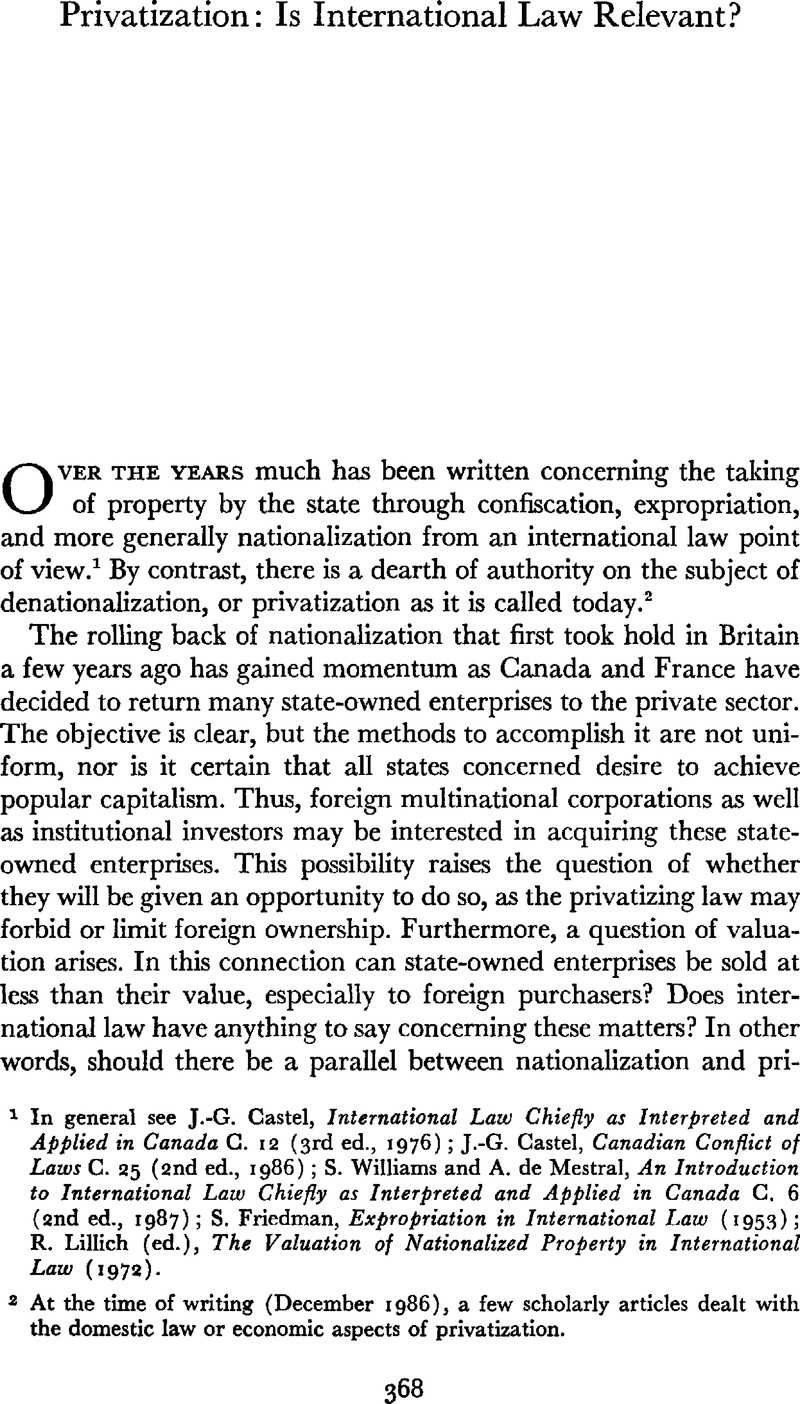No CrossRef data available.
Article contents
Privatization: Is International Law Relevant?
Published online by Cambridge University Press: 09 March 2016
Abstract

- Type
- Notes and Comments/Notes et commentaries
- Information
- Canadian Yearbook of International Law/Annuaire canadien de droit international , Volume 24 , 1987 , pp. 368 - 371
- Copyright
- Copyright © The Canadian Council on International Law / Conseil Canadien de Droit International, representing the Board of Editors, Canadian Yearbook of International Law / Comité de Rédaction, Annuaire Canadien de Droit International 1987
References
1 In general see Castel, J.-G. , International Law Chiefly as Interpreted and Applied in Canada C. 12 (3rd ed., 1976)Google Scholar ; Castel, J.-G. , Canadian Conflict of Laws C. 25 (2nd ed., 1986)Google Scholar ; Williams, S. and de Mestral, A. , An Introduction to International Law Chiefly as Interpreted and Applied in Canada C. 6 (2nd ed., 1987)Google Scholar; Friedman, S. , Expropriation in International Law (1953)Google Scholar; Lillich, R. (ed.), The Valuation of Nationalized Property in International Law (1972).Google Scholar
2 At the time of writing (December 1986), a few scholarly articles dealt with the domestic law or economic aspects of privatization.
3 See, for instance, Treaty Establishing the European Economic Community Art. 3(c) (Office for Official Publications of the ECC, Luxembourg, 1973). According to Art. 67(1), member states are bound to the extent necessary for the proper functioning of the Common Market, to abolish “restrictions on the movement of capital belonging to persons resident in Member States and any discrimination based on the nationality or the place of residence of the parties or on the place where such capital is invested.” There are escape clauses permitting suspension of the liberties promised by the treaty but they are subject to decisions of the Council of the Community: see Art. 73. According to Art. 221, member states must accord nationals of the other member states the same treatment as their own nationals as regards participation in the capital of companies and firms. Could the European Convention on Human Rights be applicable? For cases involving nationalizations, see Lithgow and Others v. United Kingdom (1984), 7 E.H.R.R. 56, where the European Commission of Human Rights stated that conditions laid down by national law for the taking of property must be in line with the requirements of the Convention. For text of Convention and Protocols, see Brownlie, I., Basic Documents in International Law 194 (1967)Google Scholar.
4 Investment Canada Act, S.C. 1984–85, c. 15, s. 14 et seq., and see infra note 8.
5 86–793, 2 juillet 1986, J.O. 3 juillet 1986, at 82401.
6 86-912, 6 août 1986, J.O. 7 août 1986, at 969.
7 Dec. 12, 1974, 3281 (XXIX): Arts. 1, 2.1, and 2.2. Castel, J.-G. , de Mestral, A. , Graham, W. C. , International Business Transactions and Economic Relations 13 et seq. (1986).Google Scholar
8 Investment Canada Act, supra note 4, s. 10(1) (f). The sale price could be set by applying the rules found in the Expropriation Act, R.S. 1970, c. 16 (1st Supp.), as amended ss. 23-27. In Ontario, see the Expropriations Act, R.S.O. 1980, c. 148, as amended, s. 13 et seq.
9 What the international rules are today is much debated. See, for instance, Texaco Overseas Petroleum Co. and California Asiatic Oil Co. v. Libya (1977), 53 I.L.R. 389; (1970), 17 Int’l Leg. Mat. 1.


